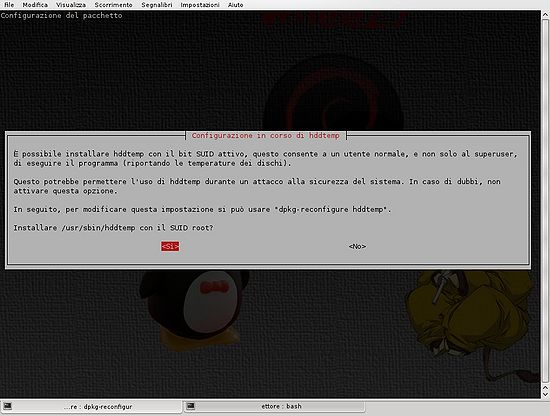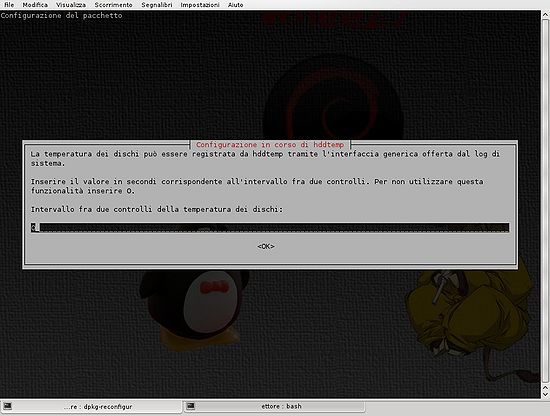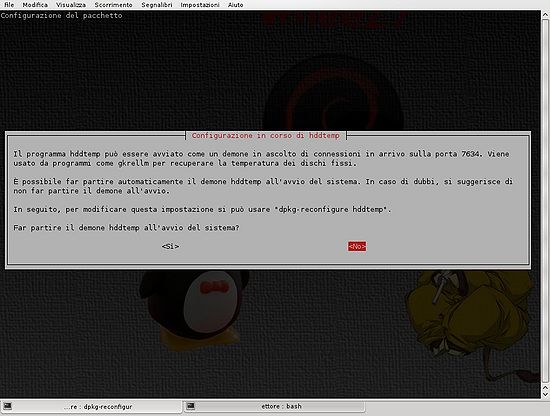Hddtemp: differenze tra le versioni
S3v (discussione | contributi) mNessun oggetto della modifica |
mNessun oggetto della modifica |
||
| Riga 1: | Riga 1: | ||
{{Versioni compatibili}} | {{Versioni compatibili|Squeeze|Wheezy|Jessie}} | ||
__TOC__ | __TOC__ | ||
=Descrizione= | =Descrizione= | ||
Versione delle 19:29, 13 mag 2015
| Attenzione. Questa guida è da considerarsi abbandonata, per via del tempo trascorso dall'ultima verifica.
Potrà essere resa obsoleta, previa segnalazione sul forum, se nessuno si propone per l'adozione. |
Debian 6 "squeeze" Debian 7 "wheezy" Debian 8 "jessie" |
Descrizione
Il programma hddtemp monitora e crea rapporti sulla temperatura dei seguenti hard disk PATA, SATA o SCSI con la lettura delle informazioni da Self-Monitoring Analysis and Reporting Technology (SMART) sulle unità che supportano questa caratteristica.
Installazione
# apt-get install hddtemp
Utilizzo
Per maggiori informazioni man hddtemp, hddtemp -h; un esempio di utilizzo:
# hddtemp /dev/sda /dev/sda: ST380023AS: 30°C
Demone
hddtemp ha anche un demone con un file di configurazione in /etc/default/hddtemp :
# Defaults for hddtemp initscript (/etc/init.d/hddtemp) # This is a POSIX shell fragment # [automatically edited by postinst, do not change line format ] # hddtemp network daemon switch. If set to true, hddtemp will listen # for incoming connections. ### cambiare da false a true ### RUN_DAEMON="true" # List of devices you want to use with hddtemp. If none specified, # hddtemp will probe standard devices. ### inserire i propri dischi ### DISKS="/dev/sda /dev/sdb /dev/sdc " # List of devices you want to use with hddtemp, but that would not be # probed for a working sensor. DISKS_NOPROBE="" # IP address of the interface on which you want hddtemp to be bound # on. If none specified, goes to 127.0.0.1. Use 0.0.0.0 to bind hddtemp # on all interfaces. INTERFACE="127.0.0.1" # Port number on which you want hddtemp to listen on. If none specified, # the port 7634 is used. PORT="7634" # Database file to use. If none specified, /etc/hddtemp.db is used. #DATABASE="/etc/hddtemp.db" # Separator to use between fields. The default separator is '|'. #SEPARATOR="|" # Logging period (in seconds) for the temperatures. If set to a value # different than 0, hddtemp will run as a daemon periodically logging # the temperatures through syslog ### tempo in secondi 300=5 minuti ### RUN_SYSLOG="300" # Other options to pass to hddtemp OPTIONS=""
dopo le modifiche potrebbe essere necessario riavviare il demone.
Per ottenere un output utile:
$ nc localhost 7634 |/dev/sda|ST31000528AS|43|C||/dev/sdb|WDC WD5000AAKS-00YGA0|46|C||/dev/sdc|WDC WD5000AAKS-00YGA0|46|C|
Permessi utente
Potrebbe essere necessario usare hddtemp come user, in tal caso riconfigurare con il comando:
# dpkg-reconfigure hddtemp
Utile nell'uso di superkaramba o conky dove molte richieste hanno i permessi dell'user e nel caso di hddtemp non rendono alcun output se mancano i permessi per eseguire il comando.
Applicazioni
È possibile usare i vari output splittandoli o tagliandoli per inserirli in altre applicazioni come superkaramba o conky.
per conky come in esempio :
${execi 300 nc localhost 7634}
per ottenenere:
/dev/sda: WDC WD5000AAKS-00YGA0: 46°C
oppure prelevando solo una parte:
${execi hddtemp -n /dev/sda |cut -c 34-38}
con output:
46°C
allo stesso modo ma cambiando la sinstassi è possibile usarlo con superkaramba come in esempio :
text x=30 y=80 sensor=program program="hddtemp /dev/sda | cut -c 24-29"
| Guida scritta da: Mm-barabba 00:49, 9 apr 2011 (CEST |  Debianized 40% Debianized 40%
|
Estesa da:
| |
Verificata da:
| |
|
Verificare ed estendere la guida | Cos'è una guida Debianized | |


